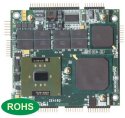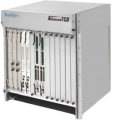Linux and automotive: reaching a tipping point
October 23, 2006 Foreword: This insightful guest column anticipates the emergence of embedded Linux as a key margins driver for the automotive industry, due to its ability to run “driver-assist” applications perceived as “high-value” by consumers. (more…)
Foreword: This insightful guest column anticipates the emergence of embedded Linux as a key margins driver for the automotive industry, due to its ability to run “driver-assist” applications perceived as “high-value” by consumers. (more…)
 [Updated Oct. 24] — The PepperPad 3 appeals to both computer neophytes and Linux hackers, suggests CarryPad Editor Steve Paine in an enthusiastic mini-review.
[Updated Oct. 24] — The PepperPad 3 appeals to both computer neophytes and Linux hackers, suggests CarryPad Editor Steve Paine in an enthusiastic mini-review.  Eurotech has released two PC/104-Plus SBCs with 800MHz Pentium III processors. The CPU-1462 features four USB 2.0 ports, while the CPU-1464 boasts gigabit Ethernet. Both use “unique construction techniques” facilitating structural heat dissipation into the enclosure, and are suitable for extended-temperature and…
Eurotech has released two PC/104-Plus SBCs with 800MHz Pentium III processors. The CPU-1462 features four USB 2.0 ports, while the CPU-1464 boasts gigabit Ethernet. Both use “unique construction techniques” facilitating structural heat dissipation into the enclosure, and are suitable for extended-temperature and…  An “escape hatch” in GPLv3 could pacify Linux kernel hackers and others concerned with anti-DRM language in the proposed license, says Free Software Foundation Europe representative Ciaran O'Riordan.
An “escape hatch” in GPLv3 could pacify Linux kernel hackers and others concerned with anti-DRM language in the proposed license, says Free Software Foundation Europe representative Ciaran O'Riordan.  What do titanium legos, “meritocric” processes (is that a word??), and Horatio Ableton the cat have in common? They're all part of Access/PalmSource VP of Engineering Michael Kelley's informative and entertaining LinuxWorld presentation, entitled “Beyond the PC: the realization of Linux in the mobile device…
What do titanium legos, “meritocric” processes (is that a word??), and Horatio Ableton the cat have in common? They're all part of Access/PalmSource VP of Engineering Michael Kelley's informative and entertaining LinuxWorld presentation, entitled “Beyond the PC: the realization of Linux in the mobile device…  Mercury Computer Systems is sampling what it claims to be the first AMC (advanced mezzanine card) based on Intel's Core Duo processor. Mercury also says its AXA-100, which is available with Linux, “doubles the compute resource available in an AMC form factor.”
Mercury Computer Systems is sampling what it claims to be the first AMC (advanced mezzanine card) based on Intel's Core Duo processor. Mercury also says its AXA-100, which is available with Linux, “doubles the compute resource available in an AMC form factor.”  [Updated Oct. 20] — Strategic Test is prepping a tiny processor module based on an 806MHz “Monahans P” processor. The 200-pin SODIMM-sized Triton-290 is expected to ship in November with a Linux 2.6-based development kit.
[Updated Oct. 20] — Strategic Test is prepping a tiny processor module based on an 806MHz “Monahans P” processor. The 200-pin SODIMM-sized Triton-290 is expected to ship in November with a Linux 2.6-based development kit.  WinSystems is shipping an x86-compatible EBX SBC (single-board computer) that runs Linux and targets M2M (machine-to-machine) connectivity applications. The LBC-GX500 is based on an AMD
WinSystems is shipping an x86-compatible EBX SBC (single-board computer) that runs Linux and targets M2M (machine-to-machine) connectivity applications. The LBC-GX500 is based on an AMD  Network equipment provider (NEP) RadiSys will resell and support high availability middleware and tools from OpenClovis, “pre-integrating” them with its Promentum family of modular, ATCA-compliant, Linux-based “application-ready” hardware.
Network equipment provider (NEP) RadiSys will resell and support high availability middleware and tools from OpenClovis, “pre-integrating” them with its Promentum family of modular, ATCA-compliant, Linux-based “application-ready” hardware.